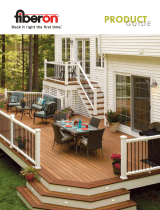
CARE AND MAINTENANCE — 9 — CLEANING YOUR DECK
RUBBER MATS
STATIC
Dry or windy environments may create a temporary condition of static electricity. Climate and site conditions may also
influence the occurrence of static electricity. Heat pumps and dryer vents that are close to, or pointed toward the decking
material, can also generate static electricity on the deck. Always position the dryer vents away from the deck. In the case of
excessive static buildup on an installed PVC or capped composite deck, we recommend the following:
1. Remove loose debris from the deck surface.
2. Dilute ACL Staticide® Concentrate 1 part to 39 parts water (1:39).
3. Spray or mop entire surface of the deck. Allow to air dry. Do not attempt to wipe the surface dry as wiping will reduce the
effectiveness of the anti-static coating.
(*Although very safe in diluted form, ACL Staticide® Concentrate is considered a hazardous chemical if left undiluted. DO
NOT use ACL Staticide® Concentrate undiluted.)
Welcome mats or grill mats with a rubber, vinyl or latex backing can mark your deck. The marks can be removed; however,
we recommend using high-quality polypropylene or colorfast woven rugs to avoid the problem. Flower pots can also create
potential problems. When pots, trays, etc., sit directly on the deck surface, moisture can get trapped. Over time, minerals
and fertilizer/plant food can build up and result in a white discoloration on the boards. We recommend using a plant stand or
other structure to elevate the pot and enable air flow underneath.
UNDER-DECK WATERPROOFING SYSTEMS
Properly installed, under-deck waterproofing systems can provide additional living or storage space. Improper installations
are those that restrict air flow and result in buildup of heat and/or humidity, which can result in unwanted consequences.
Contact the manufacturer of the specific under-deck waterproofing system for installation instructions to ensure the
required 1.5 inches (4 cm) of unobstructed cross-ventilation and air flow is achieved. If already installed, seek methods to
achieve the cross-ventilation requirement.
LADDER USAGE TIPS
º
When using a ladder, place it on a piece of 3/4-inch plywood firmly secured to the deck surface. This will
disperse the load of the ladder’s feet to nearby underlying joists.
º
Drill fasteners downward through the top of the plywood sheet into the deck board gaps. Ensure fasteners
reach into the joists to keep the plywood from slipping. This will avoid holes left in your decking once the
plywood sheet is removed.
º
Always follow the ladder manufacturer’s instructions and safety tips as well.





















